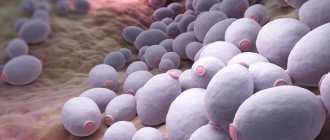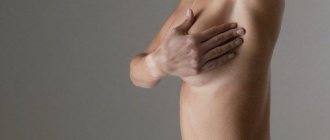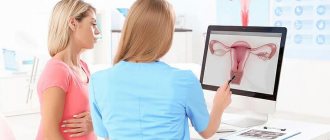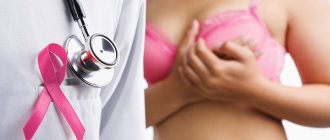Many women complain of thrush appearing before menstruation. Why does thrush start just before menstruation? What is the reason for this? The indirect causes of such an unpleasant phenomenon may be hidden in hormonal changes that actively occur in the body during the premenstrual period, which creates good conditions for the proliferation of opportunistic microorganisms.
That is why thrush and menstruation are not considered as concomitant phenomena.
In addition, many women mistakenly associate thrush (candidiasis) with ovulation, which occurs in the middle of the cycle.
The causes of thrush that occurs before menstruation often indicate that the disease has become chronic.
This explains the frequency of relapses, which often occur during menstruation. Mid-cycle flare-ups are usually a common coincidence.
Pathogenesis and causes of thrush in women
Candidiasis is caused by microorganisms of the opportunistic group - yeast-like fungi Candida. Normally, they live in more than 80% of the human population of the planet. Candida survives due to interaction with the human body and normally does not pose any danger.
Fungi of this class can be found not only in the female vagina, but also in the oral cavity, on the skin and in the esophagus. Candida is even involved in some digestive processes.
A balanced acid-base ratio inhibits the growth and spread of fungal infections. An alkaline environment predominates in the oral cavity and blood - pH 6.8-7. And in the vagina, stomach and skin it is acidic, pH from 3.4 to 5.5. Fungi are capable of reproduction in a neutral or slightly alkaline environment - pH 6-6.7.
Most often, women encounter the vulvovaginal form of candidiasis. The acidic environment of the vagina is interconnected with its microflora. In the healthy version, lactobacilli predominate there, and conditional pathogens make up 1% of all microorganisms. The role of lactobacilli is very important, because if their level suddenly decreases, it will negatively affect the pH. Thus, all opportunistic microorganisms, including Candida fungi, have a chance to reproduce and spread.
Two main factors provoke the death of lactobacilli:
- Weakening of the immune system - due to stress, hypothermia, when changing sexual partners, long-term antibiotic therapy and autoimmune diseases.
- Hormonal imbalance - due to menstruation, pregnancy, taking steroids and contraceptives, diabetes and thyroid dysfunction.
When the fungus is activated, women experience discomfort and painful symptoms - cheesy discharge, unpleasant odor, redness and swelling of the vulva, itching and burning in the intimate area.
The vast majority of women experience thrush, and often more than once. But why does thrush and itching appear before menstruation?
A systematic decrease in immunity, hormonal fluctuations, as well as ineffective antifungal therapy can lead to the development of a chronic form of candidiasis.
Candidiasis before menstruation occurs in women with low immunity and unstable hormonal levels. Thrush often occurs during menstruation.
To better understand the causes of the disease, it is necessary to understand how the menstrual cycle functions and what processes can provoke infection.
Symptoms of candidiasis
The symptoms of candidiasis before menstruation are no different from the symptoms of thrush during other periods. Among them:
- itching, burning in the genital area;
- redness and swelling of the labia and vagina;
- cramps and pain during urination and intimacy;
- discharge that has a cheesy consistency, sometimes watery.
The itching may be constant and worsen in the evening or at night, after sexual intercourse. Sometimes this condition can cause insomnia and nervous disorders. Itching may be the only symptom of candidiasis.
Vaginal discharge is usually profuse, especially after sexual intercourse. They can be white or greenish in color, have a curd consistency with a sour smell.
In some cases, candidiasis of the bladder (cystitis) and urethra (urethritis) may occur. These conditions are characterized by itching and burning during urination, pain in the bladder and in the area of the external opening of the urethra.
In the case of complicated candidiasis, extensive erythema (redness), swelling, disruption of the integrity of the skin and mucous membranes with the formation of cracks may occur.
The menstrual cycle and provocateurs of candidiasis
The entire menstrual cycle can be divided into 2 hormonal stages - estrogen and progesterone.
Period of estrogen dominance
The first begins on the 1st day of menstruation, when the level of estrogen in the female body begins to rise. The rise of estrogen is necessary to ensure the follicular process in which a healthy egg matures. Estrogen peaks in the middle of the cycle, when ovulation occurs - the egg leaves the ovary and can be fertilized within 2 days. In the place where the egg once matured, the corpus luteum is formed, which produces progesterone.
Period of progesterone dominance
In the second half of the cycle, the level of estrogen rapidly decreases, and progesterone, on the contrary, increases. This is necessary to maintain conception, which could have occurred during ovulation. If fertilization has occurred, progesterone will be needed to maintain the viability of the embryo and the formation of the placenta. But if conception does not take place, the egg will reach the uterus empty, which will give a signal for the onset of menstrual bleeding. Shortly before the onset of menstruation, progesterone levels decrease.
The hormonal system should ideally work without failures or fluctuations. However, the hormonal background of a modern woman is constantly being tested, including:
- stress;
- excessive physical activity;
- colds;
- sudden weight loss and gain;
- unbalanced diet;
- sexual infections;
- taking oral contraception;
- chronic disorders of the liver, kidneys, thyroid gland;
- diabetes;
- lack of normal sleep patterns;
- presence of bad habits.
Factors that are perceived as routine in a woman’s life can disrupt the functioning of sex hormones.
Thrush a week before your period can occur along with signs of premenstrual syndrome. Hormonal swings that spoil a woman’s mood and general well-being can reduce the protective functions of the vaginal microflora.
During PMS, many women, in order to cheer themselves up, begin to abuse sweets and do not at all follow proper nutrition. Sweets are an excellent breeding ground for candida. And since the body is deprived of useful microelements, its ability to resist infections is significantly reduced.
Physiological changes that affect the female hormonal system can cause an unpleasant disease. Thus, vaginal dysbiosis can begin due to pregnancy or abrupt discontinuation of contraceptives. These events may simply coincide in time with the period before menstruation.
In pregnant women
Thrush often accompanies pregnancy, causing unpleasant symptoms and exposing the baby to the risk of infection.
Manifestations of the disease are classical in nature, namely: itching, the appearance of plaque and thick, pasty discharge. If pink discharge appears due to thrush during pregnancy, you should consult a doctor as soon as possible to find out the cause. Slight bleeding from the genital tract for 1-2 days may indicate implantation of the embryo into the wall of the uterus, when destruction of blood vessels occurs. Usually this appears on the 6th-7th knock after fertilization and the woman does not yet know about her situation.
In later stages of pregnancy, pink leucorrhoea against the background of thrush may be the first sign of a threat of spontaneous abortion due to poor attachment of the placenta or insufficiency of progesterone in the mother's body.
Also, do not forget about endometriosis, inflammatory diseases of the female reproductive system and tumor processes, which worsen during pregnancy and are characterized by a progressive course, which will be accompanied by pinkish discharge and more.
Pathological disorders
Sometimes the problem is more serious. If thrush worsens every month before your period, this may indicate the presence of disturbances in the functioning of the endocrine system.
Sex hormones are only part of the human endocrine system. In addition to the intimate sphere, hormones are produced in the adrenal glands, pancreas, thyroid gland, pineal gland and hypothalamic-pituitary part of the brain.
An important part of the hormonal system is the thymus, the organ responsible for the selection and “training” of T cells of the immune system. Hormonal disruption can occur in any part of the endocrine system, and since all organs that produce hormones are interconnected, disturbances in one department can provoke disruptions in another.
Since the immune and hormonal systems are interconnected, a weakened immune system can also cause microflora disturbances before menstruation. It can occur due to hormones, colds, stress, or uncontrolled use of antibacterial and steroid drugs.
If itching and other symptoms of thrush constantly appear before menstruation, a woman needs to visit a gynecologist and undergo a comprehensive diagnosis. Even if the discomfort goes away after menstruation, it is important to find out why the protective functions of the vaginal microflora regularly fail.
Reasons for the problem
Thrush is a fungal disease that appears against the background of decreased immunity, including local immunity, in the vaginal area.
The causes of thrush before menstruation can be varied. At the same time, spotting itself does not cause it, contrary to popular belief.
So, the list of reasons:
- The same decrease in immunity: a weakened body cannot resist the onslaught of fungi. This situation can occur if there are vitamin deficiencies, frequent stress, overexertion, against the background of diets used, when the body lacks nutrients, and after various surgical interventions
- Using a course of antibiotics: broad-spectrum drugs especially often give a reaction, because antibacterial therapy eliminates all flora, including healthy ones. But fungi are not susceptible to it and continue to multiply quite actively
- Using sweets and baked goods in your diet in large quantities - Candida loves sweets, because. such a nutrient medium is most optimal for them
- Presence of diabetes mellitus: endocrine disorders also disrupt the immune system
- Taking hormonal contraceptives: when taken for a long time, they disrupt the regulation of the female reproductive system
- Hormonal surges
- Insufficient or poor personal hygiene
- Regular infection from a partner who is a carrier of candidiasis
- Swimming in dirty ponds
All these reasons lead to the appearance of irritating factors. If we talk specifically about thrush, then the answer to the question: why does thrush appear before menstruation is simple.
A woman is a carrier of fungi, which usually lie dormant in the body due to the absence of provoking factors. However, the menstrual cycle is a complex system and it occurs in certain stages.
For example, a week before menstruation, thrush may appear because hormonal changes begin. Due to the lack of conception and against the background of ovulation, there is a drop in female hormones - estrogens.
Along with them, a change in the microflora occurs - some of the beneficial microflora dies. Fungi, on the contrary, become more at ease, and they begin to grow with a vengeance.
It also happens, and often, that after the bleeding starts the situation stabilizes and the thrush goes away on its own. However, this does not mean that the woman has recovered.
Therefore, in any case, if thrush appears every month before your period, you should visit a specialist after the second cycle.
A change in diet before your menstrual cycle is another reason why thrush starts before your period.
Due to hormonal changes, a chain of closely related processes is launched:
- Lack of good mood hormones, which can lead to menstrual depression
- An increase in the stress hormone cortisol: because of it, the level of glucose in the blood begins to rise, making it difficult to break it down and utilize it into cells
The body is trying to cope with the situation as best it can - it lacks happiness hormones. Therefore, it triggers complex compensation mechanisms, against the background of which a craving for sweets, desserts, candies begins to develop - in a word, for everything that is not worth eating if you have thrush.
Increasing the amount of glucose only benefits fungi, which are known to feed on carbohydrates.
Accelerated metabolism can also have an effect. During the period from ovulation to the beginning of the cycle itself, it begins to noticeably accelerate, because... sex hormones begin to actively prepare the woman’s body for conceiving and bearing a child.
Chronic thrush
Chronic candidiasis can cause thrush to suddenly begin before menstruation and then go away.
The occurrence of chronic candidiasis is secondary. This means that the woman has already had an outbreak of acute candidiasis, which has degenerated into a recurrent one. This can happen if the fungus is not treated correctly.
Chronic infection also develops against the background of chronic diseases that reduce the stability of the immune and endocrine systems.
Recurrent thrush is more difficult to treat because the fungus develops resistance to antifungal drugs.
It often happens that the medicine helps relieve unpleasant symptoms only for a while - from a week to several months. But then the disease returns, and the drug no longer helps at all.
A distinctive feature of recurrent pathology is also the milder manifestation of symptoms. The full symptoms of the disease may be absent for a long time and appear only during exacerbations. Therefore, it is not easy to notice candidiasis the rest of the time.
Chronic thrush worsens when the activity of immune agents is reduced or hormonal fluctuations occur. Often the time before menstruation becomes favorable for an aggravated fungus.
Why does thrush appear before menstruation?
Many women on the eve of the “red days” ask themselves the question: “why does thrush appear before menstruation.” There are several reasons why this disease develops. And not only women, but also men are susceptible to this. In their cases, damage to the genital organs by fungal infections is less pronounced than in women.
Often, the disease in women in a chronic form makes itself felt several times a year, and sometimes even more often. The symptoms of candidiasis worsen on the eve of menstruation, leaving women perplexed. It's time to find out why thrush appears most often before menstruation.
Diagnosis and treatment of candidiasis before menstruation
Effective treatment of chronic thrush includes mandatory medical diagnosis. Since the disease appears at adjacent pH levels, it is not only fungi that can infect the body.
Mixed infections with thrush are not uncommon. This condition is called bacterial vaginosis.
Since it is difficult to determine one pathogen in mixed vaginosis, the disease requires treatment with broad-spectrum drugs. Whereas for the treatment of candida, fungicidal medications are sufficient. The results of the microflora analysis determine what therapeutic course the doctor will use.
Self-medication for thrush is strictly prohibited.
Due to the prevalence and relative harmlessness of the disease, women often treat its treatment superficially and do not even consider it necessary to visit a doctor. Instead, they treat the disease with a drug that was once prescribed to them, or buy something at the pharmacy that has good reviews. There is a third category that treats candidiasis using traditional methods.
Self-medication for thrush is the most common mistake in caring for women's health. Even if the medications you have chosen for the treatment of thrush before menstruation have good reviews and have helped one of your loved ones, in a particular case they may be ineffective. Especially if the patient is not exactly sure what she is treating.
Candidiasis is not an inflammatory infection, and therefore almost does not harm the reproductive organs; with thrush you can even become pregnant, but the fungus harms the vagina and vulva.
Candidiasis is dangerous not only because of its unpleasant symptoms. Fungal colonies cause irritation and damage to the vaginal mucosa. They loosen the protective shell, which, in addition to painful sensations, increases the risk of dangerous infections getting inside.
Candidiasis does not allow the vaginal secretory ability to cleanse itself to function normally. In the future, ordinary thrush can cause a lot of harm to women's health. Therefore, this disease can and should be treated by a gynecologist.
In addition to diagnosis, effective treatment includes the following steps:
Antifungal therapy
At this stage, drugs of the antimycotic group are usually used, these include polyenes and azoles. The medicine can be used in the form of a suppository, tablets or ointment. In case of acute candidiasis, a complex course is usually required using local or oral medication together with a remedy for external use.
Restoration of microflora and vaginal mucosa
Depending on the severity of the disease, it can be carried out in addition to the main therapy or after completion of the antimycotic course. For this purpose, drugs with anti-inflammatory and regenerating properties are used. Preparations with lacto- and bifidumbacteria help restore the microflora.
Relapse Prevention
This is a particularly relevant measure for repeated infections, as well as for pregnant women. Prevention can be carried out with lower dosages of fungicides. But sometimes a restorative course and adherence to recommendations on personal hygiene and nutrition are enough.
Treatment methods
Despite popular belief, candidiasis is not a sexually transmitted disease. Paired treatment of the disease is necessary only for pronounced symptoms in the partner. During therapy, sexual rest is necessary until the signs of the disease completely disappear.
Due to the limited availability of drugs used to treat thrush during menstruation, therapy should be delayed until after menstruation. If you are very concerned about the symptoms of thrush during menstruation, your doctor will tell you what to do. Basically, at this stage, treatment comes down to the use of oral antifungal drugs. And after the end of menstruation, complex therapy will be prescribed. It is used as:
- vaginal suppositories;
- oral medications;
- topical ointments;
- douching.
Additionally, immunomodulators and probiotics may be prescribed. A special diet is recommended, excluding sweet, fatty, smoked and salty foods. The diet should contain a large amount of fermented milk products, as well as products that have a direct antifungal effect: garlic, ginger, propolis, grapefruit, hot red pepper, etc.
Treatment is not done with antibiotics, as they can only worsen the situation. In the acute form of candidiasis, tablet drugs are prescribed, as a rule, once. Sometimes treatment can take a week. The most common means:
- Futsis;
- Pimafucin;
- Flucostat;
- Fluconazole;
- Nystatin;
- Clotrimazole, etc.
You should not prescribe pills yourself, as the fungal infection may be resistant to the components of the drug. In this case, the treatment will not be successful.
Together with oral medications, the doctor may prescribe suppositories and topical ointments . Among them:
- Terzhinan candles;
- Pimafucort ointment;
- Clotrimazole ointment;
- Livarol suppositories;
- suppositories Polygynax.
The use of traditional medicine recipes in conjunction with basic treatment will also be effective. Using herbs and tinctures helps relieve symptoms and speed up recovery.
Most often, for thrush, chamomile decoction is used for douching. This plant is a natural antiseptic. For a liter of boiling water you will need 3 tsp. dry grass. The solution must be infused and used up to 5 times a day. You can add oak bark in equal proportions to the chamomile decoction.
Baking soda will help eliminate thrush. Take 1 tsp per glass of boiled water. soda Douching can be done up to 6 times a day.
Treatment of chronic candidiasis requires more time. Therapy will need to be carried out for 4 to 12 months, once a month. Everything is individual, so strict control by a gynecologist is important.
Simple prevention of thrush
Effective prevention of exacerbations of thrush before menstruation can be done without taking medications. Taking care of your intimate health and immune system will help you avoid relapses of the disease.
The following preventive measures will help to avoid candidiasis before menstruation:
- Regular genital hygiene. Regular washing with warm water 2-3 times a day is required. You can use a specialized gel for intimate hygiene. Douching should not be done, as this procedure can harm the vaginal microflora and should not be done just like that.
- Balanced diet. Mushrooms love yeast and sweets, so women prone to exacerbations of thrush should avoid fast carbohydrates, sweets and alcohol. You also need to be careful with diets. If the body is starving and does not receive the proper amount of nutrients, immunity decreases and the risk of thrush increases.
- Selection of the right personal hygiene products and underwear and natural fabrics. Fragrances and fragrances included in soaps, pads and tampons can cause an allergic reaction, which can weaken the local immunity of the vagina and disrupt the natural microflora. Underwear made from synthetic materials not only causes allergic irritation, but also prevents the skin of the genitals from “breathing.” The result is a cramped, warm, moist environment that fungi love.
- Take antibiotics carefully. If you need to take a course of antibacterial drugs, never neglect taking probiotics. They will help minimize the negative impact of bactericidal drugs on the microflora of the intestines and vagina.
If you are prone to chronic candidiasis, it is important for a woman to constantly monitor the state of her intimate health and adhere to preventive measures.
The causes of thrush before menstruation may include physiological changes in the female body and pathological disorders of the endocrine system. Therefore, the regular occurrence of fungal infections during the premenstrual period cannot be ignored. You need to seek gynecological diagnostics and undergo an antifungal course of treatment. Preventive measures and comprehensive care for women’s health will also help against recurrent thrush.
How to deal with thrush correctly?
Candidiasis that occurs before menstruation has pronounced unpleasant symptoms. The smell and itching become more intense and cause a lot of discomfort. Several years ago, doctors did not resort to treatment for a disease that appeared during such a period. However, today effective means have been created to combat the disease even on delicate days. The cessation of symptoms of the disease does not mean that it has gone away completely, so treatment is carried out comprehensively, in certain courses.
Experts, even having established why thrush appears before menstruation, say that it is difficult to cure. The period of delicate days excludes the use of gels, ointments, vaginal tablets, suppositories and suppositories. You cannot douche with medicinal solutions. The basis of the treatment process consists of the patient taking capsules and tablets orally. Here is a list of funds that can be prescribed:
The listed drugs are not without contraindications, their composition is toxic, and it is prohibited to prescribe them yourself. Only the doctor makes the decision to take a particular drug. Along with the drug fight against thrush, a woman needs to strengthen her immunity. Drugs such as interferon, tincture of echinacea and ginseng will help reduce the loss of protection.
To solve the problem, it is useful to balance your diet. Introduce cereal dishes, lean fish, lean meat, and eggs into your diet. Give up your favorite yeast dough and sweets. Drinking alcoholic beverages is prohibited; there is no place on the menu for smoked, pickled, spicy or pickled foods. Naturally, food should have a minimum fat content.
Conclusion
Thrush before menstruation often worries girls of reproductive age. Most of them prefer to deal with the problem on their own, experiencing relapses every cycle. Using vaginal antifungal agents is not enough; in case of frequent relapses or severe symptoms, it is necessary to take antifungal drugs orally. In the chronic form of vaginal candidiasis, a more comprehensive treatment is required, which involves: eliminating the pathogen, restoring the correct microflora and maintaining immunity.
Sources:
https://griboktela.ru/kandidoz/molochnitsa-pered-mesyachnymi.html https://mymatka.ru/molochnica/molochnica-pered-mesyachnymi https://www.baby.ru/wiki/cto-delat-esli- molocnica-nacinaetsa-kazdyj-mesac/
Illness after menstruation
Itching after menstruation confirms the likelihood of this disease. The reasons for the appearance of thrush after menstruation are similar to the factors that provoke the development of the disease in any phase of the cycle. In most cases, candidiasis after the end of the critical days is provoked by unstable hormonal levels and an excess of analgesics used to relieve pain.
Experts are confident that the end of menstruation is the best period to begin a course of treatment for vaginal candidiasis. Some types of suppositories used to treat illness are recommended to be used a week after the end of menstruation.
How to deal with the problem
It is necessary to determine the causes and begin treatment for thrush before menstruation as soon as it appears. The therapy will be complex.
Even during menstruation, if necessary, it will be necessary to use special antifungal tablets for treatment. Typically they offer drugs such as Fluconazole, Fucis and Diflucan.
Suppositories may be prescribed. They get as close as possible to the affected area and have a more targeted effect. At the same time, they are not washed out with blood and continue to work quite effectively even during regular bleeding.
Suppositories are selected by a doctor. But among the popular ones are:
They restore flora, relieve swelling and even eliminate inflammation. To select the optimal remedy, it is often recommended to take a culture test for sensitivity in order to choose a more targeted remedy.
Joint therapy with a partner is also a mandatory part of treatment. After all, if a man is infected with fungi, he will transmit them back with every contact.
Today, all drugs for the treatment of thrush are created in duplicate, including for men. They can use acceptable forms - ointments and tablets. Often the drugs are taken once, so no special effort is required from the man.
What can happen if thrush is not treated:
- Cervical erosion
- Spikes
- Decreased sensitivity and elasticity of the vagina (and this can come back to haunt you during childbirth and cause tears and cracks)
- Inflammation of the uterus, genitourinary system.
- Infertility.
Agree, the complications are formidable. Therefore, you definitely need to go to the doctor. You can’t be shy and wait for it to go away on its own. As doctors say: if before the start of your period you have signs of thrush for more than 2 months in a row, this means that the fungus has firmly established itself in the body, and candidiasis becomes chronic.











